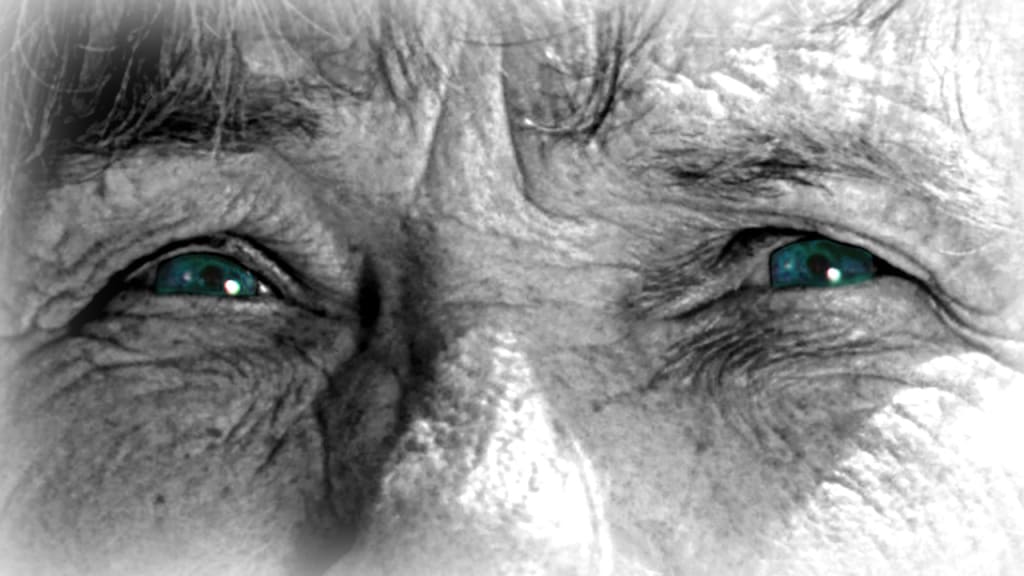
She pushed through the doorway of the used bookstore and was encouraged by the rich aroma of paper and time. This had been her late husband’s haunt when he needed an escape. Maybe it could be hers as well.
The fraction of her life without him existed only in some obscure region of her memory. Destiny had designated them neighbors first, then friends, then classmates, then lovers, then legally united. Their marriage had been lengthy and relatively idyllic; she could remember only a single serious quarrel, or at least its vague details: a flash of wet jeans from the washing machine, a work-issued pager silenced forever, and the echo of his roar through the ethereal unknown: Who doesn’t check the pockets?
She had spent the morning missing him, drifting through the cluttered apartment, an aimless wraith tracing lines in the dust with papery fingertips. Her morose eyes were still unable to meet the shelves laden with trinkets – some that were his, some hers, most of them theirs and there for decades, inexorably headed for a permanent parting. All but a few would be discarded, the valued survivors handed down or headed for auction.
Her empty gaze also skirted the photos. Would Dawn want those? Does anyone even bother with physical photos anymore? I’ll give 'em to her anyways – she could always put 'em on the computer using the skimmer thing.
She had called her daughter then, and after some awkward small talk more suited to strangers, asked, “How’s Joanie doing?”
“It’s Joseph now, mom.”
“Joseph, of course, I know,” she said, wincing. “Old brain syndrome.”
“Hey, mom, I’ve got a million things to get to right now – here – talk to him.”
There was a silence, then the sound of muffled incoherence and a sense of reluctance.
“Hi, grandma.” Joseph’s deep voice startled her, so different from the chirp to which she was accustomed.
“Hi, sweetheart.” Terms of endearment were safer. She rummaged through her old brain for something to say, unprepared for conversation with her only grandchild. “Your mom told me you got your driver’s license.”
“Yep,” he said. “Mom said I can take the car to work today. I can drive over to your place for a visit after if you want. I get off at five.”
Her heart danced at this unexpected delight. “Oh, yes, that would be wonderful!”
After the call, she determined a trip to the store was in order. She was low on everything and wanted to have dinner ready for her grandson whether he was hungry or not. While she labored into her coat, her gut tightened with the familiar anxiety that was an offshoot of her newfound loneliness and on some days enough to change her mind about leaving at all. Today she would power through it.
Her thoughts were still on her transgender grandson as she took the elevator down. The last time she’d seen him was at lunch with his mom a few weeks ago. He’d spent much of the meal enthused to discuss his testosterone treatments and how eager he was to get a bilateral mastectomy. His mom was full of tenacious counterpoints, and his grandma agreed with them all: how painful the procedure was, how dangerous anesthesia was, how ridiculous unnecessary surgery was, not to mention how expensive it was. Times were tough and body conformity was simply a luxury they couldn’t afford. But then she saw the resolute ice in the eyes of her grandson, and understood in an instant that no pain, no risk, no cost, no hell could be worse for him than the hell of living his masculine life following in the wake of those copious breasts.
She wanted so much to advocate for him but didn’t know how. When her church denounced his community, she wanted to rise and shout his defense and impossibly show them the talented, kind, and sensitive soul that was her grandson, demand they look past the cover and focus on the content. But by revealing her authority on the subject, she would be outing him, and that she knew she must never do.
The used bookstore was three blocks down, halfway between her building and the general store. As she had passed its glass doors guilelessly painted with the word “BOOKS,” a tremor of providence battled the tension in her stomach. She turned around, her mind disengaged from the body that pushed open the doors and entered.
Unlike the library, this haven of books was a raucous environment, full of chatting customers and scampering children. Her arrival had interrupted a spirited writers group, but they’d already turned back to their earnest critiques by the time she’d collected her bearings. A sizable calendar near the counter announced upcoming book club meetings, author signings, launch parties, and book events for the little ones.
“Old on the right, new or mildly used on the left, children’s at the back,” droned an attractive young teen behind the counter, her eyes locked on the screen of her phone.
“I guess I belong on the right, then,” she said wryly and was rewarded with the counter girl’s tired-joke smile. Feeling awkward, the old woman perused a selection of novels before noticing a wire bin full of haphazardly stacked books labeled “MILDLY USED.” On closer inspection, she saw the bin contained a diverse assortment of notebooks, sketchbooks, and diaries. She flipped through a few and saw some of them had names inside, along with a scribble or two on the first page but were otherwise blank. She was about to turn away when she saw the rounded corner of a small black book poking through two bars at the bottom of the bin. For a moment, her vision swam.
It was her husband’s notebook.
Impossible. Just a few days ago she had come across the chic journal in the top drawer of his desk, sparking a memory of the day he’d brought it home and confessed its price. She had felt a glimmer of hope for what could be a final communication from her spouse – something to help shake the feeling that when he left, he left too much unsaid. She was disappointed to discover that most of the pages were bare, aside from a few obsolete financial notes, so she had tucked it back in the drawer, mentally chiding the ghost of her husband for not putting his precious notebook to better use.
She waved to the counter girl to get her attention. “Could I see that little black book, please?”
Once the notebook had been extracted from the deep pile, she realized that while it was the same color, style, size, and brand as her husband’s, this book was older. She ran her thumb down its worn cover and plucked at the strap, noting it had lost some of its spring.
“I’ll take it,” she said, not knowing why she wanted it. The counter girl nodded and brought it up to the register.
“This is nice,” the girl commented as she removed the strap and rifled the ivory pages, presumably searching for hidden valuables. She then astonished the old woman by turning to the back cover and slipping her hand into an expandable opening that ran along the spine. “Always gotta’ check the pockets.”
A dawning filled the old woman’s head and she hurried away without a word, leaving the notebook and confused counter girl behind.
* * *
Her grandson had eaten heartily of the spaghetti she had prepared and was sitting back, sated and probably eager to get home. She slid the notebook across the table to him. “This is a gift from your grandfather. And from me.”
“Thanks, Grandma.” He picked up the notebook and absently thumbed its pages, likely thinking it was too sophisticated in appearance for his taste. He set it back on the table. “It’s really nice. Did it belong to Grandpa?”
“It did,” she smiled, catching his eye. “And I think you forgot to check the pocket.”
His face lit with comprehension, and he examined the notebook more thoroughly, a frown playing across his features right before he discovered the pouch on the inside of the back cover. His fingers began trembling as he unfolded and fanned out the 20 time-worn paper bills, each adorned with a portrait of President Grover Cleveland, each bearing the number 1,000 in all four corners, front and back.
“I don’t….” he rasped.
She briskly cut him off. “Now, don’t go putting those in a bank. They haven’t printed large bills like that in a long time, and I’m pretty sure each is worth more than its face value, so you’ll need someone who knows about such things. Remember Tony from the jewelers? He was friends with your grandpa – he’ll do right by you. I can call him for you if you want.”
Joseph was silent, his head bowed, and she heard rather than saw a tear fall heavily to his jeans. He sniffed, and she cleared her throat, longing to cuddle him as she used to but not knowing the extent to which masculine pride was influenced by biology and generation, and how all of it played into the relationship between a grandmother absent the grandfather to a teenage grandson no longer a granddaughter.
Joseph at last looked up, eyes awash with damp joy, and he stood and embraced her. She hugged him back, reveling in a tangibility she hadn’t felt in a long time.
* * *
That evening, as she turned off the news and gathered the courage to face the too-large, lonely bed, she heard the ringing of laughter filtering down through the ceiling.
The gigglers are at it again, her husband would have grumped.
She wrapped herself in her robe, grabbed a dusty bottle of wine from the rack, and headed out.
The young women sitting on crates around a burn barrel fire turned at the sound of her opening the access door to the building’s flat roof. She recognized them all as residents, having occasionally shared an elevator or passed them in the lobby. Their expressions exuded guilt and defiance, expecting her to demand an end to their party.
“May I join you?” she asked, holding up her offering.
She was welcomed warmly and took a seat on one of the crates. She sipped the wine that was proffered in a Solo cup, fleetingly wondering if the alcohol would react with her medications. The night’s chill was kept at bay by the fire, the drink, the company, and a newfound inner glow.
“It’s so very nice to finally really meet you all. I’m…” and she uttered her name, surprised by its foreign taste on her tongue.
“I’m sorry about your husband,” said the one whose name she remembered began with a T and whose large brown eyes were swimming with reflected firelight and sincerity. The old woman thanked her as she enjoyed another sip and swished the wine’s earthy tartness, heedless of the stains that threatened her dentures. She took advantage of the next lull in the conversation.
“I had an interesting day today,” she said, and they gave her their rapt attention.
* * *
About the Creator
Karin Kaltofen
A designer of litigation exhibits by profession, writer by passion.
Enjoyed the story? Support the Creator.
Subscribe for free to receive all their stories in your feed. You could also pledge your support or give them a one-off tip, letting them know you appreciate their work.






Comments
There are no comments for this story
Be the first to respond and start the conversation.